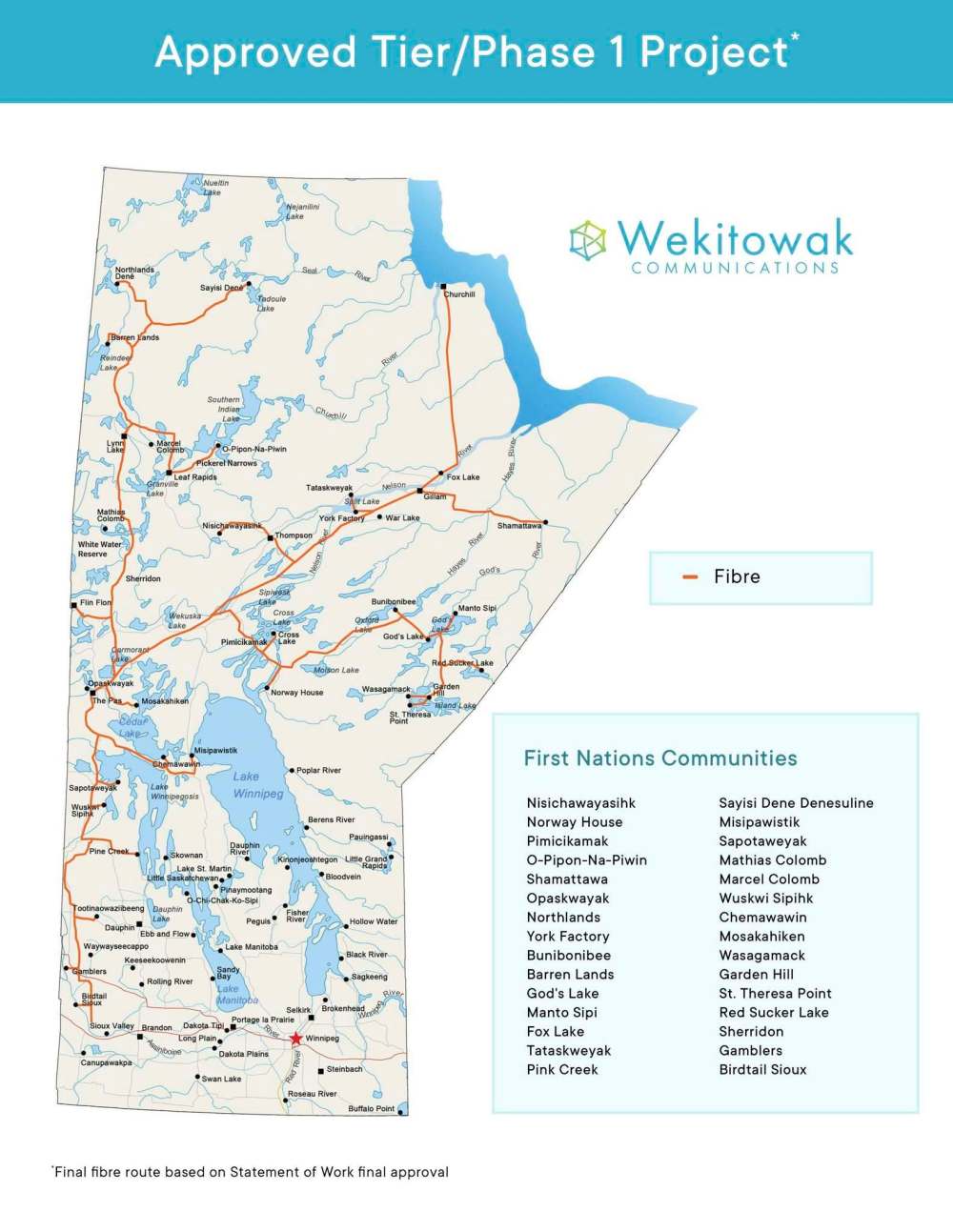High speed internet connection for northern Manitoba back on track
Advertisement
Read this article for free:
or
Already have an account? Log in here »
To continue reading, please subscribe:
Monthly Digital Subscription
$0 for the first 4 weeks*
- Enjoy unlimited reading on winnipegfreepress.com
- Read the E-Edition, our digital replica newspaper
- Access News Break, our award-winning app
- Play interactive puzzles
*No charge for 4 weeks then price increases to the regular rate of $19.00 plus GST every four weeks. Offer available to new and qualified returning subscribers only. Cancel any time.
Monthly Digital Subscription
$4.75/week*
- Enjoy unlimited reading on winnipegfreepress.com
- Read the E-Edition, our digital replica newspaper
- Access News Break, our award-winning app
- Play interactive puzzles
*Billed as $19 plus GST every four weeks. Cancel any time.
To continue reading, please subscribe:
Add Free Press access to your Brandon Sun subscription for only an additional
$1 for the first 4 weeks*
*Your next subscription payment will increase by $1.00 and you will be charged $16.99 plus GST for four weeks. After four weeks, your payment will increase to $23.99 plus GST every four weeks.
Read unlimited articles for free today:
or
Already have an account? Log in here »
Hey there, time traveller!
This article was published 22/10/2018 (2613 days ago), so information in it may no longer be current.
A project that could provide at least 50 northern communities — including 31 First Nations — with high speed fibre optic Internet connections has now been sorted out and is underway.
The $65-million construction project that is expected to take at least three years to complete was originally announced in January with $33.5 million from the federal government’s Connect to Innovate program and about $20 million of in kind support from the province. It will utilize the excess capacity of Manitoba Hydro Telecom’s Internet backbone that was built to support Manitoba Hydro’s far-flung northern operations.
The project is being undertaken by an entity called Wekitowak Communications Inc. which is a partnership that will be 49 per cent owned by RFNow Inc., a technology company out of Virden that provides Internet service options in rural Manitoba and Saskatchewan, and Mathias Colomb First Nation. Other Manitoba First Nations have an option to buy in at $1 per share.

Krista Campbell, director general of the Connected Canada branch of Innovation, Science and Economic Development Canada, said even though the project was originally announced in January it is on track and on schedule.
“When we approve something we conditionally approve it and then we have to get into the weeds,” she said. “All these large projects do change marginally when we start to do the engineering survey and and map out the project. It takes several months to get the negotiations done. This project is well advanced.”
What has changed, however, is that a First Nation entity called Clear Sky Connections that had been a partner in project is no longer involved.
Mixed messages and some amount of confusion has been caused by that association and even on Monday, an official with Clear Sky Connections still said negotiations were on-going.
But Campell said succinctly, “Clear Sky Connections… had been part of the original proponent supporting Wekitowak but they are no longer part of that agreement.”
Clarence Easter, chief of Chemawawin Cree Nation, speaking on behalf of Wekitowak said, “This project was almost allowed to be derailed by a negatively oriented and competing First Nations led group that also submitted a proposal under the same criteria… The non-successful entity has been misrepresenting their position and almost caused an entire region of Canada (Northern Manitoba) that currently has minimal services to lose all opportunity to move forward and ensure all communities are connected.”
Meanwhile, Easter said there are bulldozers out there digging trenches and laying fibre and that many First Nations have already confirmed their participation in the project.
The massive undertaking, that is scheduled to extend as far north as Barrens Land and as far east as Shamattawa, will have the challenging task of laying about 3,120 kilometres of fibre optic cable through the tough terrain of Northern Manitoba.
Chris Kennedy, the chief operating officer of RFNow, said, “We know how to do this. We have been doing it for a while, this is just a bigger project.”
The idea is to connect communities and then provide support for them to set up their own Internet service provider operations. Wekitowak will use First Nation owned construction companies as much as possible and work with whatever existing Internet service provider might already be present.
For instance, Easter said Chemawawin does have Internet service but it is unreliable and does not have the capacity to run the kind of operations most people in the south take for granted.
Kennedy said fibre will be run to schools and health care facilities at each community that signs on to the service and then they will be able to decide how much more fibre to the home they want to build.
“We will not be forcing this on any community,” he said.
martin.cash@freepress.mb.ca

Martin Cash has been writing a column and business news at the Free Press since 1989. Over those years he’s written through a number of business cycles and the rise and fall (and rise) in fortunes of many local businesses.
Our newsroom depends on a growing audience of readers to power our journalism. If you are not a paid reader, please consider becoming a subscriber.
Our newsroom depends on its audience of readers to power our journalism. Thank you for your support.

